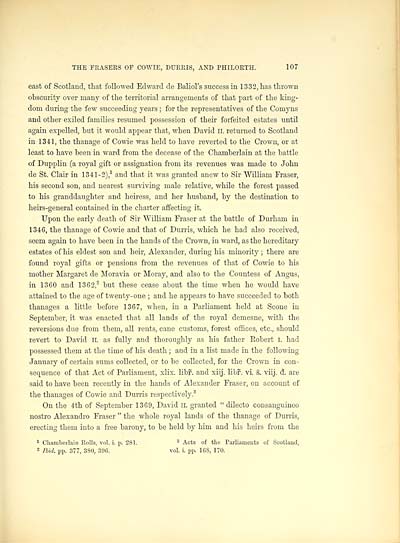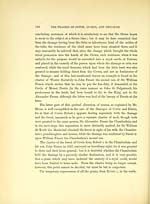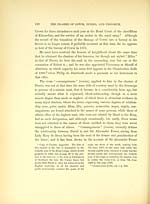Frasers of Philorth > Volume 1
(139)
Download files
Complete book:
Individual page:
Thumbnail gallery: Grid view | List view

THE FEASEES OF COWIE, DTJRRIS, AND PHILORTH. 107
east of Scotland, that followed Edward de Baliol's success in 1332, has thrown
obscurity over many of the territorial arrangements of that part of the king-
dom during the few succeeding years ; for the representatives of the Comyns
and other exiled families resumed possession of their forfeited estates until
again expelled, but it would appear that, when David II. returned to Scotland
in 1341, the thanage of Cowie was held to have reverted to the Crown, or at
least to have been in ward from the decease of the Chamberlain at the battle
of Dupplin (a royal gift or assignation from its revenues was made to John
de St. Clair in 1341-2), 1 and that it was granted anew to Sir William Praser,
his second son, and nearest surviving male relative, while the forest passed
to his granddaughter and heiress, and her husband, by the destination to
heirs-general contained in the charter affecting it.
Upon the early death of Sir William Fraser at the battle of Durham in
1346, the thanage of Cowie and that of Dun-is, which he had also received,
seem again to have been in the hands of the Crown, in ward, as the hereditary
estates of his eldest son and heir, Alexander, during his minority ; there are
found royal gifts or pensions from the revenues of that of Cowie to his
mother Margaret de Moravia or Moray, and also to the Countess of Angus,
in 1360 and 1362, 2 but these cease about the time when he would have
attained to the age of twenty-one ; and he appears to have succeeded to both
thanages a little before 1367, when, in a Parliament held at Scone in
September, it was enacted that all lands of the royal demesne, with the
reversions due from them, all rents, cane customs, forest offices, etc., should
revert to David II. as fully and thoroughly as his father Eobert I. had
possessed them at the time of his death ; and in a list made in the following
January of certain sums collected, or to be collected, for the Crown in con-
sequence of that Act of Parliament, xlix. libf. and xiij. libr. vi. s. viij. d. are
said to have been recently in the hands of Alexander Praser, on account of
the thanages of Cowie and Durris respectively. 3
On the 4th of September 1369, David II. granted " dilecto consanguineo
nostro Alexandra Praser " the whole royal lands of the thanage of Durris,
erecting them into a free barony, to be held by him and his heirs from the
1 Chamberlain Rolls, vol. i. p. 2S1. 3 Acts of the Parliaments of Scotland,
2 Ibid. pp. 377, 380, 396. vol. i. pp. 16S, 170.
east of Scotland, that followed Edward de Baliol's success in 1332, has thrown
obscurity over many of the territorial arrangements of that part of the king-
dom during the few succeeding years ; for the representatives of the Comyns
and other exiled families resumed possession of their forfeited estates until
again expelled, but it would appear that, when David II. returned to Scotland
in 1341, the thanage of Cowie was held to have reverted to the Crown, or at
least to have been in ward from the decease of the Chamberlain at the battle
of Dupplin (a royal gift or assignation from its revenues was made to John
de St. Clair in 1341-2), 1 and that it was granted anew to Sir William Praser,
his second son, and nearest surviving male relative, while the forest passed
to his granddaughter and heiress, and her husband, by the destination to
heirs-general contained in the charter affecting it.
Upon the early death of Sir William Fraser at the battle of Durham in
1346, the thanage of Cowie and that of Dun-is, which he had also received,
seem again to have been in the hands of the Crown, in ward, as the hereditary
estates of his eldest son and heir, Alexander, during his minority ; there are
found royal gifts or pensions from the revenues of that of Cowie to his
mother Margaret de Moravia or Moray, and also to the Countess of Angus,
in 1360 and 1362, 2 but these cease about the time when he would have
attained to the age of twenty-one ; and he appears to have succeeded to both
thanages a little before 1367, when, in a Parliament held at Scone in
September, it was enacted that all lands of the royal demesne, with the
reversions due from them, all rents, cane customs, forest offices, etc., should
revert to David II. as fully and thoroughly as his father Eobert I. had
possessed them at the time of his death ; and in a list made in the following
January of certain sums collected, or to be collected, for the Crown in con-
sequence of that Act of Parliament, xlix. libf. and xiij. libr. vi. s. viij. d. are
said to have been recently in the hands of Alexander Praser, on account of
the thanages of Cowie and Durris respectively. 3
On the 4th of September 1369, David II. granted " dilecto consanguineo
nostro Alexandra Praser " the whole royal lands of the thanage of Durris,
erecting them into a free barony, to be held by him and his heirs from the
1 Chamberlain Rolls, vol. i. p. 2S1. 3 Acts of the Parliaments of Scotland,
2 Ibid. pp. 377, 380, 396. vol. i. pp. 16S, 170.
Set display mode to:
![]() Universal Viewer |
Universal Viewer | ![]() Mirador |
Large image | Transcription
Mirador |
Large image | Transcription
Images and transcriptions on this page, including medium image downloads, may be used under the Creative Commons Attribution 4.0 International Licence unless otherwise stated. ![]()
| Histories of Scottish families > Frasers of Philorth > Volume 1 > (139) |
|---|
| Permanent URL | https://digital.nls.uk/96567168 |
|---|
| Attribution and copyright: |
|
|---|
| Description | A selection of almost 400 printed items relating to the history of Scottish families, mostly dating from the 19th and early 20th centuries. Includes memoirs, genealogies and clan histories, with a few produced by emigrant families. The earliest family history goes back to AD 916. |
|---|

